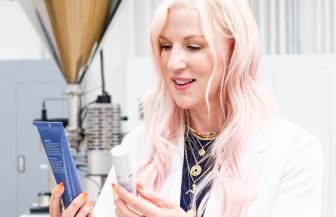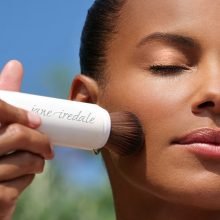[ad_1]
Between pool days, ice cream, and warm, breezy nights, there’s plenty to love about summer. What’s not to love, though, is the way it can exacerbate or even cause certain issues for your skin. Constant exposure to heat and sun poses its own set of challenges.
As an esthetician, I love talking to my peers and hearing the latest advice they have to offer. I thought you would like to hear it, too, so I reached out to 8 of my fellow skincare experts. Here are their top tips for healthy, beautiful skin (so you can get back to all the fun parts of summer!).
1. Dr. Uju Rapu
Dr. Rapu is a dermatologist and the founder of Belfiore Aesthetics.
Q: What are the most common skin concerns you see at your clinic during summer?
“Certain skin conditions can occur more commonly during the summer when skin is exposed to sunlight. These include hyperpigmentation, sunburn, heat rash, rosacea, sun allergies, and skin cancers. Melanin is a pigment that protects our skin from the damaging effects of the sun’s rays. So, although all skin types are affected by direct exposure to the sun’s rays, some sun-related skin concerns are more commonly seen in fairer skin types that have less melanin.”
Q: How can these concerns be mitigated?
“Protecting skin from direct sunlight is vital in managing these concerns. Stay out of the sun between 11 a.m. and 3 p.m. when its rays are the strongest. Wear a broad-spectrum sunscreen with an SPF of 30 or higher and apply frequently (every 2-4 hours when outdoors). UV rays also penetrate glass windows and therefore it’s important to wear sunscreen even when indoors. Don’t forget the neck and chest!
When you can, wear sun-protective accessories and clothing such as wide-brimmed hats, UV sunglasses, and fabrics with UV absorbers. Sun exposure can cause dehydration, so be sure to drink plenty of water during the hotter months. Also, switching to a more lightweight, hyaluronic acid moisturizer in summer will help maintain moisture levels without making your skin feel sticky when you sweat.
Finally, see your dermatologist if you notice any new growths or changes to an existing mole on your skin.”
2. Joanna Vargas
Joanna Vargas is a celebrity esthetician, author, and founder of her eponymous brand.
Q: What professional treatments should someone focus on in the summer?
“I like focusing on keeping the skin exfoliated, repaired, and hydrated in summer. My favorite treatments include things like the hydra facial (a great way of gently exfoliating and infusing product into the skin), cryotherapy (for oxygenation and soothing redness), and LED light for building collagen and repairing damage.”
Q: Are there any at-home devices that are particularly good for summer?
Q: What’s your favorite way to re-apply sunscreen over makeup without disturbing it?
3. Jordan Samuel
Jordan Samuel is an esthetician and founder of Jordan Samuel Skin.
Q: What’s the best way to manage sensitive skin with redness or rosacea during the hot summer months?
“Keep it cool! Whether it’s the water from your shower or sink, bring the temperature now a notch. This applies year-round, but it is especially relevant in summer and a must-do for those of us with sensitive skin. This will ensure you are not starting and ending your day irritated and sensitized.
You can also gently massage facial skin with the backs of cold spoons after you have applied your product. This can help take the heat out of the skin and also just feels really nice. SPF is also so important in managing redness and other symptoms in rosacea-prone skin, so finding the right SPF for your skin is a key element in ensuring your skin will be happy.”
Q: Are there any specific ingredients, products, or techniques you recommend for managing redness and rosacea in the heat?
“Ingredient-wise, I am a big fan of allantoin for helping to combat sensitivities and reduce redness in certain skin tones. On the technique front, I find doing less is best. Fewer products, less stimulation, less friction, and less massage. While these stimuli can be great for certain skin conditions, they are things that I would want to avoid for rosacea-prone skin.”
Q: What’s a common mistake people make with their summer skincare routine?
“Don’t be afraid to reassess your summer skincare routine if you aren’t getting your desired results. I think people forget how much outside factors, like temperature and humidity changes, can have a temporary effect on our skin. While something might work for you in the colder months, it may now be helping to create the perfect storm for increased irritation when combined with increasing temperatures.”
4. Ron Robinson
Ron Robinson is a cosmetic chemist and founder of BeautyStat Cosmetics.
Q: Which skincare ingredients should people focus on during summer?
“Vitamin C is essential because our bodies can’t make it. We either have to ingest it or apply it topically.
“Vitamin C is a great ingredient for summertime for 2 reasons: 1) It’s a powerful antioxidant that helps fight free radicals that can damage the skin, and it may work synergistically with sunscreen to give you better UV protection. 2) It helps to inhibit the overproduction of melanin, which helps to even out skin tone and diminish hyperpigmentation that might be exacerbated by the sun.”
Q: How often should vitamin C be applied to address hyperpigmentation?
“If you’re concerned with uneven skin tone or hyperpigmentation, apply your vitamin C serum twice a day—morning and night. In the morning, follow immediately with sunscreen.”
5. Caroline Hirons
Caroline Hirons is an esthetician, brand consultant, author, and beauty blogger.
Q: What’s the biggest mistake people make regarding their summer skincare routine?
“The biggest mistake people make during summer is not using enough SPF. Sunscreen is needed all year round, but particularly during the summer months. It would be great if people with ulterior motives stopped fearmongering and scaring people out of using sunscreens.”
Q: Any extra tips for optimizing our summer skincare routines?
“Some people might find it beneficial to switch to a lighter moisturizer, and although you absolutely don’t have to, I love keeping my facial mists in the fridge.”
6. Dija Ayodele
Dija Ayodele is an esthetician and founder of West Room Aesthetics.
Q: What’s the best way to prevent ingrown hairs from shaving or waxing during summer?
“There are a few steps people can take to prevent ingrowns caused by hair removal:
- Prepare the skin thoroughly by using a gentle chemical exfoliator with alpha-hydroxy acids such as lactic or glycolic acid to remove any old skin cells from the surface and get a closer shave.
- Avoid using a dull blade as they can harbor bacteria and are more likely to contribute to ingrowing hair.
- Always shave in the direction of hair growth and avoid going over the same area repeatedly. Also, use shaving cream so the skin has some lubrication. Dragging a blade across dry skin is not pleasant!
- Stop any body retinoid products a week before waxing to avoid lifting and damaging the skin when waxing.
- After shaving or waxing, gently cleanse the skin with cool water or apply a soothing gel containing aloe vera to calm any irritation.
- Exfoliate the skin again 2-3 days after hair removal to prevent ingrowing hairs.
Following these steps consistently can help reduce the frequency and severity of ingrown hairs.”
Q: How should someone treat an ingrown hair once it appears?
“If you find an ingrowing hair avoid picking and tweezing at it whilst it is under the skin. Instead, exfoliate regularly with a chemical exfoliator 2-3 times a week until the hair is able to release. For more concentrated and quicker exfoliation, use an exfoliating pad on the area.
Once you can see the hair, you can use sterile tweezers to gently pull and release it. If there is any resistance, stop and continue with chemical exfoliation.”
Q: What’s the best way to remove hair without causing hyperpigmentation?
“The removal of hair using traditional methods such as shaving or waxing can lead to a darkening of the skin due to the irritation that it causes. This is called post-inflammatory hyperpigmentation and can be more pronounced on darker skin tones. Where possible, laser hair removal is a better long-term option as this drastically reduces hair density as well as volume.”
7. Shani Darden
Shani Darden is a celebrity esthetician and founder of Shani Darden Skin Care.
Q: Is it okay to use retinol in the summer?
“If you’re someone who spends a lot of time in the sun, I recommend not using retinol in the summer. However, if you generally don’t spend a ton of time outside during the summer, it’s completely fine to use retinol or acids! Just limit time in the sun and make sure you’re wearing sunscreen every day, as well as reapplying every two hours to keep skin glowing and healthy.”
Q: What’s a common mistake people make when it comes to sun protection?
“Don’t forget to protect your lips and hands from the sun! These often-forgotten areas are some of the first that show signs of aging. When applying sunscreen, make sure to cover your hands and reapply after washing them. Remember to also protect your lips with an SPF lip balm or gloss. I always keep a couple SPF lip glosses on hand so that I’m never without one!”
Q: How can melasma be managed during summer?
“If you deal with melasma, make sure you’re taking extra care to protect your skin in the summer. Heat and sun exposure (along with hormones) can cause melasma to flare up.
Of course, keeping your face protected with sunscreen and a wide brim hat is essential when you’re outside, but you have to make sure you’re keeping your face cool too! I always use a mini portable fan to keep my face cool when I’m outside. I have also been known to use a thick layer of mineral sunscreen on my upper lip where my melasma shows up for extra protection.”
As Shani said, heat, sun, and melasma certainly don’t mix. Here’s my personal experience with heat and brown spots and all my tips for managing this tricky condition.
8. Dr. Kavita Mariwalla
Kavita Mariwalla is a dermatologist and founder of Mariwalla Dermatology.
Q: Aside from sunscreen, what’s a good way to protect skin from harmful UV rays?
“If you don’t want to buy sun-protective clothing, you can make your own by using Rit Sunguard. It’s a treatment that goes right in with your laundry and washes UV protection into your clothes. Each treatment provides a UPF rating of 30 to your clothing, and it lasts for up to 20 washes!”
Quotes have been edited and condensed for clarity
Celebrity Esthetician & Skincare Expert
As an esthetician trained in cosmetic chemistry, Renée Rouleau has spent 30 years researching skin, educating her audience, and building an award-winning line of products. Her hands-on experience as an esthetician and trusted skin care expert has created a real-world solution — products that are formulated for nine different types of skin so your face will get exactly what it needs to look and feel its best. Trusted by celebrities, editors, bloggers, and skincare obsessives around the globe, her vast real-world knowledge and constant research are why Marie Claire calls her “the most passionate skin practitioner we know.”
[ad_2]
Source link





